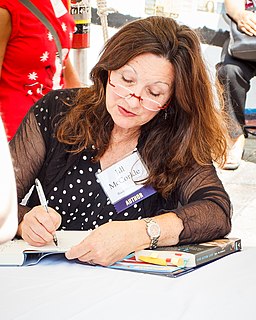A Quote by Jonathan Dee
You never want to be in a position where your reader feels like you're passing judgment on your own characters. Any novel where you feel like the author is talking to the reader over the characters' heads is in a bad place.
Related Quotes
Make sure your characters are worth spending ten hours with. That’s how long it takes to read a book. Reading a book is like being trapped in a room for ten hours with those characters. Think of your main characters as dinner guests. Would your friends want to spend ten hours with the characters you’ve created? Your characters can be loveable, or they can be evil, but they’d better be compelling. If not, your reader will be bored and leave.
It's easy to feel like you don't have any control over yourself or your life or your body as a teen - everything is changing so fast, and a lot of it feels so outside of your power. I think that's why a lot of teens form really strong attachments to fictional characters or celebrities, draw their own characters or write themselves into fan fiction.
My readers have to work with me to create the experience. They have to bring their imaginations to the story. No one sees a book in the same way, no one sees the characters the same way. As a reader you imagine them in your own mind. So, together, as author and reader, we have both created the story.
One of the keys is, and it may sound funny, talking about characters with super powers, but one of the keys is to make your characters as realistic and believable as possible. Even if they have super powers, you say to yourself, "Well, if somebody had a super power like this, what would his life be like? Wouldn't he still maybe have to go to the dentist or wouldn't he have to worry about making a living? What about his love life?" You've got to make characters that your reader can believe exists or might exist.
I feel really strongly about not wanting to overly guide the reader about what he or she should think. I really trust the reader to know for themselves and not to need too much. You have your own imagination, your own experiences, your own feelings, and a novel wants ultimately to ask questions. It doesn't assert anything, or shouldn't, I think.
When you write a book, you want to have fidelity to the character. Characters and their emotions guide the structure of the novel. The author is aware that there's a certain amount of information she/he has to provide in order to satisfy the reader, knowing that she/he has set something up that must be paid off, but this payment must be made while maintaining fidelity to the characters.
I feel like I've finally got to this place that I really want to be. The place where, in my fantasy, the characters just get up and walk around - this interstitial place between humans and dolls. But I also feel like, where am I supposed to go from here? Because this feels like the place I've always wanted to be, for my whole life of shooting.







































